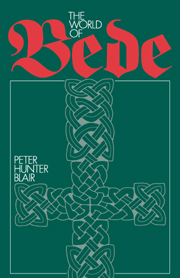Book contents
- Frontmatter
- Contents
- Foreword by Michael Lapidge
- Preface
- List of Abbreviations
- PART ONE ALTER ORBIS
- PART TWO TOWARDS CHRISTIANITY
- PART THREE THE GROWTH OF MONASTICISM
- PART FOUR LEARNING, TEACHING AND WRITING
- 19 The Regular Life
- 20 The Bible in the West
- 21 The Northumbrian Bible
- 22 Education and the Grammarians
- 23 Reading and Psalmody
- 24 Number and Time
- 25 The Lives of Saints
- 26 Secular and Christian Books
- 27 Candela Ecclesiae
- Select Bibliography
- Index
22 - Education and the Grammarians
Published online by Cambridge University Press: 02 February 2010
- Frontmatter
- Contents
- Foreword by Michael Lapidge
- Preface
- List of Abbreviations
- PART ONE ALTER ORBIS
- PART TWO TOWARDS CHRISTIANITY
- PART THREE THE GROWTH OF MONASTICISM
- PART FOUR LEARNING, TEACHING AND WRITING
- 19 The Regular Life
- 20 The Bible in the West
- 21 The Northumbrian Bible
- 22 Education and the Grammarians
- 23 Reading and Psalmody
- 24 Number and Time
- 25 The Lives of Saints
- 26 Secular and Christian Books
- 27 Candela Ecclesiae
- Select Bibliography
- Index
Summary
Bede, as we have seen, was by his own testimony seven years old when he was entrusted for his education to the care of Benedict Biscop at Wearmouth which had been founded in 673, only a year or so after his birth. He was about seventeen when Benedict Biscop died in 689, and by that date he had already been in the care of Abbot Ceolfrith at Jarrow for some years. Since we know that Benedict had been frequently called away from the monastery to attend to the king's business, we may suspect that it was Ceolfrith who was mainly responsible for Bede's education. Beyond his early skill as a singer, witnessed by the incident of the plague at Jarrow in 686, we know nothing directly about these early years of Bede's life before his ordination as deacon in his nineteenth year, c. 691. Nevertheless, against the background of education and scholarship in western Europe as a whole, we can infer something about the means which enabled him later in his life to indulge his delight in learning, teaching or writing. Bede's parents were not to know that the age of seven was of significance within the educational system of the Roman empire, where it marked the transition from the child (infans) to the boy (puer) who at the age of fourteen became a young man (adolescens) but when Bede himself came later to read Gregory's Commentary on Job, he would find the same threefold division between infancy, when the infant, though living innocently, does not know how to give expression to his innocence, the age of boyhood when the boy is able to put into words what he wants to say, and the age of adolescence which marks the beginning of labour.
- Type
- Chapter
- Information
- The World of Bede , pp. 237 - 252Publisher: Cambridge University PressPrint publication year: 1990



